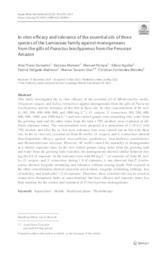In vitro efficacy and tolerance of the essential oils of three species of the Lamiaceae family against monogeneans from the gills of Piaractus brachypomus from the Peruvian Amazon.
In vitro efficacy and tolerance of the essential oils of three species of the Lamiaceae family against monogeneans from the gills of Piaractus brachypomus from the Peruvian Amazon.
Author(s): GONZALES, A. F.; MAMANI, V.; PEREYRA, M.; AGUILAR, E.; MATHEWS, P. D.; TAVARES - DIAS, M.; FERNÁNDEZ - MÉNDEZ, C.
Summary: This study investigated the in vitro efficacy of the essential oil of Minthostachys mollis, Origanum vulgare, and Salvia rosmarinus against monogeneans from the gills of Piaractus brachypomus and the tolerance of this fish to these oils. In vitro concentrations of M. mollis (80, 200, 400, 600, 800, and 1000 mg L-1), O. vulgare, S. rosmarinus (80, 200, 400, 600, 800, 1000, and 1500 mg L?1 ) and two control groups (one containing only water from the growing tank and the other water from the tank + 70% alcohol) were evaluated at different exposure times. The concentrations were prepared at a proportion of 1:10 w/v with 70% alcohol, and after the in vitro tests, tolerance tests were carried out on fish with these oils. In the in vitro test, essential oil from M. mollis, O. vulgare, and S. rosmarinus showed dose-dependent efficacy against Anacanthorus spathulatus, Anacanthorus penilabiatus, and Mymarothecium viatorum. However, M. mollis caused the mortality of monogeneans in a shorter exposure time. In the two control groups using water from the growing tank and water from the growing tank + alcohol, the monogeneans showed similar behavior during the 6 h of exposure. In the tolerance tests with 80 mg L-1 of essential oil from M. mollis, O. vulgare, and S. rosmarinus during 1 h of exposuse, it was observed that P. brachypomus showed irregular swimming and tolerance without causing death. Fish exposed to the other concentrations showed opercular acceleration, irregular swimming, lethargy, loss of mobility, and death after 1 h of exposure. Therefore, these essential oils can be tested in consecutive therapeutic baths at concentrations that have efficacy and exposure times less than sedation for the control and treatment of P. brachypomus monogeneans.
Publication year: 2022
Types of publication: Journal article
Unit: Embrapa Amapá
Keywords: Azeite, Parasito de Animal, Peixe de Água Doce
Observation
Some of Embrapa's publications are published as ePub files. To read them, use or download one of the following free software options to your computer or mobile device. Android: Google Play Books; IOS: iBooks; Windows and Linux: Calibre.
Access other publications
Access the Agricultural Research Database (BDPA) to consult Embrapa's full library collection and records.
Visit Embrapa Bookstore to purchase books and other publications sold by Embrapa.

